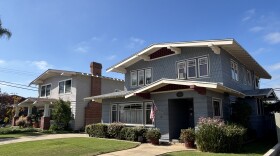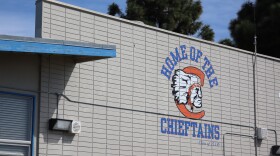Last summer, Jeanie Ward-Waller began speaking up to her superiors at Caltrans about the planned expansion of Interstate 80 outside Sacramento. She suspected the agency was being dishonest about the project's true impacts on things like air pollution and climate change — something that Caltrans denies.
Shortly after calling for an outside audit of the I-80 expansion, Ward-Waller was fired. She filed a claim of whistleblower retaliation and began speaking publicly about her claims.
Ward-Waller was the opening speaker at last week's California Bicycle Summit, which took place in San Diego. KPBS spoke with her about her case and what it says about the state's commitment to climate action.
It's been about six months since you were fired from your executive level position at Caltrans. You challenged that dismissal with a claim of whistleblower retaliation. Can you just give us an update on the status of that claim?
Ward-Waller: Yeah, I can tell you that I've since left Caltrans. I'm in a new role outside the department, and my claims are still pending. That's about as much as I can say.
This all has to do with a planned expansion of Interstate 80 in the Sacramento area. You claimed that Caltrans was trying to evade the state's environmental laws and hide the true impacts of this freeway expansion — those impacts being more driving, more greenhouse gas emissions. Without getting too deep into the details of that particular project, what do you think Caltrans' pursuit of this expansion says about its commitment to fighting climate change?
Ward-Waller: I think the main thing I would say is there's still a long way to go for Caltrans to really shift away from feeling like driving is the only option, and the only solution is continuing to expand our freeways — to focusing on providing alternatives for people so they have safer and more sustainable ways to get around their communities.
California has a goal of net zero greenhouse gas emissions by 2045. That's about 20 years away. What needs to change in our daily lives, in our infrastructure, in how we organize our economy, in order for us to achieve that goal?
Ward-Waller: It is pretty complicated. The solutions are many — are varied. They include things like building more affordable housing in existing communities so people can live close to where they work, live in neighborhoods where there's already infrastructure, things like sidewalks, public transit. The more we build new communities farther away, the more we're working against those goals. But certainly how we invest in our transportation infrastructure has a lot of influence on how those development patterns happen and change. The more we are expanding freeways, the more we're making it easier for people to drive farther, to afford homes farther away from those existing communities. So that's really working against our goals of getting to net zero carbon emissions.
We're here at the California Bicycle Summit in San Diego. What is your message to the activists who are working up and down the state trying to make cycling a safer and more mainstream transportation option?
Ward-Waller: I'm so excited to be here at the CalBike Summit. I used to be an employee of CalBike, so it does feel like coming home for me. My biggest message, I think, is just that there's no better time, no more important time to be doing this work — not just for bicycle advocacy, but advocacy for sustainable transportation, for better land use, for things like equity and racial justice, environmental justice. All of those issues intersect with making sure our streets are safer for bicycling. So it's important for our bicycle advocates to be working with advocates for all of those different issues to really be successful.
The environmental costs of our car culture, our car infrastructure, I think are pretty clear. Cars and trucks are the greatest source of greenhouse gas emissions. They're big sources of air pollution that has public health impacts. But I think if you talk to most Californians, they would say issues like the economy and inflation are higher priorities for them. They're more top of mind, as opposed to a less tangible threat like climate change. What would you say to those people?
Ward-Waller: Well, California is already being impacted every day, every year. We see worse and worse disasters like wildfires, like sea level rise, major storms, drought. Those impacts are worsening because of climate change every year. So these things do impact people's everyday lives. And I think they most impact the communities that have the least resources to do anything about it. So the communities that are already divided by freeways, already most impacted by air pollution from freeways, those are going to be the communities that are most impacted by things like severe heat, as well, and the effects of climate change. So we all need to be engaged in changing the system and changing how we get around and ensuring that our governments are providing better options to get around to make sure that those who are most burdened today do not continue to be the most burden in the future.
Do you see a connection between climate change and those kitchen table issues like inflation and the economy?
Ward-Waller: Yeah, absolutely. I mean, the amount of money that goes towards our gas taxes to then maintain the system that we all rely on, even if you mostly drive and you can get everywhere in a car easily today, you know that the system is not well maintained. You care about things like filling potholes, keeping the system that you rely on for driving in a state of good repair. And so that is a pocketbook issue that affects people every day. The more we expand that system, the less we have the ability to maintain what we have, and that's going to impact everyone. And it certainly impacts how we spend our dollars.
What do you think is the biggest misunderstanding that people have about transportation, transportation policy?
Ward-Waller: I think the biggest misconception is that it's not possible to provide other options. That our infrastructure is the way it is, and there's no other way to do it, and that other options aren't going to work. They're not going to be viable for people to change behavior. And that's just not true because frankly, most of the car-based infrastructure that we have today was built in the last 50 years. If we re-imagine what we could have in the next 20 or 30 or 50 years, it could look totally different in that time period. And we just have to be creative and imagine our communities and our infrastructure differently.








